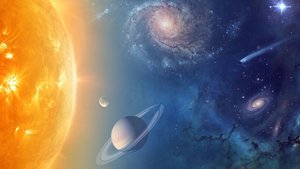Researchers detect traces of water in atmospheres of hot Jupiters
16 Dec 2015
With astronomers discovering more and more gas giants around other stars, the question being increased posed is 'where is the water?'

The distant worlds, known as hot Jupiters, had appeared to be strangely dry – a mystery that ran counter to accepted concepts of planet formation.
However, with the use of the Hubble and Spitzer space telescopes scientists think they might have solved the mystery; the gassy planets' atmospheres had blocked the water behind thick clouds.
Nature has published the findings, which could add to our knowledge of the evolution and formation of planets. Scientists would also be able to better understand understand atmospheres of the distant worlds.
There are several worlds thought to possess liquid water beneath their surfaces, and many more that have water in the form of ice or vapour. Water is found in primitive bodies like comets and asteroids, and dwarf planets like Ceres. The atmospheres and interiors of the four giant planets -- Jupiter, Saturn, Uranus and Neptune -- are thought to contain enormous quantities of the wet stuff, and their moons and rings have substantial water ice (See: The Solar System and beyond is awash in water).
According to Jonathan Fortney, a planetary astrophysicist at University of California at Santa Cruz, while gas giants might be relatively easy to spot due to their size, their interiors remained largely unknown. He added, not much was known about our own Jupiter.
He pointed out that the last probe into the planet's thick atmosphere was the Galileo 20 years ago.
Researchers had long presumed that gas giant planets would have large amounts of water within them, given that oxygen after hydrogen and helium, was the most abundant element in the universe.
Earlier studies had failed to detect any trace of water in the extremely hot atmospheres, but the exoplanets' proximity to their stars also made them difficult to examine.
"I'm really excited to finally 'see' this wide group of planets together, as this is the first time we've had sufficient wavelength coverage to be able to compare multiple features from one planet to another," study lead author David Sing, of the University of Exeter in the UK, said in a press release. "We found the planetary atmospheres to be much more diverse than we expected."
The researchers detected traces of water and other molecules. Their observations also other revealed elements in the atmospheres of the hot Jupiters, and also hazy clouds that made it difficult to notice such traces.
"The alternative to this is that planets form in an environment deprived of water - but this would require us to completely rethink our current theories of how planets are born," Fortney, said in a release. "Our results have ruled out the dry scenario, and strongly suggest that it's simply clouds hiding the water from prying eyes."
In April 2015, researchers at the Niels Bohr Institute in Copenhagen, Denmark, said Mars has huge glaciers of frozen water covered with thick layer of dust that appears as surface of the ground (NASA's Curiosity rover finds evidence of water below surface of Mars) .
By measuring with exquisite precision the tiny wobbles of Saturn's moon Enceladus – whose cosmic quavers are detectable only in high-resolution images taken by NASA's Cassini spacecraft – Cornell University researchers have learned that a global ocean lies beneath the moon's thick icy crust (Under Saturnian moon's icy crust lies a 'global' ocean ).


















